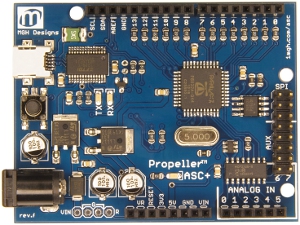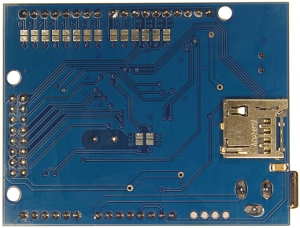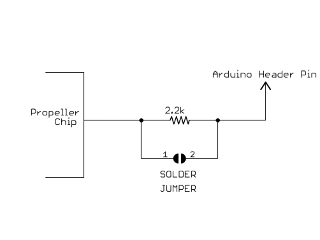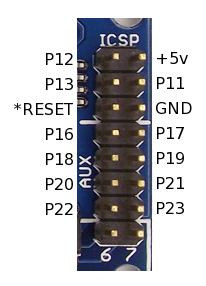Asc: Difference between revisions
Martin Hodge (talk | contribs) (Created page with "link=|Propeller ASClink=|Propeller ASC Propeller ASC schematic: * Revision "f" PCB - file:pasc-f.pdf The Propeller ASC is...") |
Martin Hodge (talk | contribs) |
| (One intermediate revision by one other user not shown) | |
(No difference)
| |
Latest revision as of 19:14, 17 September 2016


Propeller ASC schematic:
- Revision "f" PCB - File:Pasc-f.pdf
The Propeller ASC is an Arduino Shield Compatible prototyping system designed to use existing Arduino add-on boards with the Propeller's SPIN language or Propeller Assembly. To stay up to date with the development of this product, please subscribe to this thread at the Parallax forums.
Features
- mini-USB interface using FT232RL.
- MCP3208 12-bit analog to digital converter. Data sheet
- 3.3v AUX port for extra digital I/O or TV/keyboard/mouse or RGB using only a few resistors.
- Fourteen Arduino compatible, current protected 3.3v digital I/O pins.
- PWM, I2C, SPI, UART and more, in any combination on any pin.
- A 32K EEPROM for storage of your programs. (64K on ASC+ • 32K for program • 32K for data)
- 3.3v and 5v voltage regulators.
- Can be powered from the USB port or with 6-12v 2.1mm power jack.
- Power from USB is protected by a 500mA polyfuse.
Software
- Download the free Propeller software from the Parallax website at http://www.parallax.com
- Brad's Spin Tool is a little more advanced option that will also run on Linux.
- For professional development and debugging in the SPIN language, ViewPort is hard to beat
- For drag-and-drop programming, the 12-Blocks GUI is a must-have.
- A large list of Arduino shields can be found at http://shieldlist.org.
- If C is your preference, try the free Catalina C or PropGCC
- For a nice "UNIX like" interface check out spinix
Current Limiting & 5 volt compatibility

The Propeller chip is a 3.3 volt device, so the ASC uses a series of 2.2K resistors to protect pins P0 through P13. Since some Arduino shields are designed to use 3.3 volts, there are bypass jumpers on the back of the ASC to take the current limiting resistors out of the circuit. These resistors will not interfere with low speed signals such as buttons or switches. However, high speed signals like those of an SPI or I2C device might be attenuated too much for the Propeller to detect. In these cases adding a blob of solder across the appropriate jumper on the back will alleviate this problem.
Add-on cards

These add-on cards make use of the Propeller ASCs AUX header on the right side of the board. This header is integrated with a standard Arduino "ICSP" (or "SPI") header above it, and pins 6 and 7 from the ADC chip below. WARNING: Pins P16 through P23 are not protected! Do not apply above 3.3 volts to these pins!
KVM Adapter
- KVM Adapter Schematic: File:Pasc-kvm.pdf

VGA Adapter
- VGA Adapter Schematic: File:Pasc-vga.pdf







